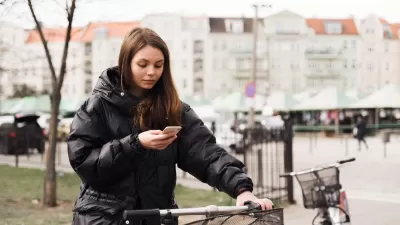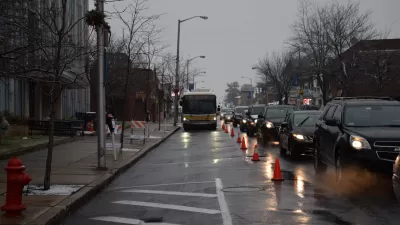The placement of new bike lanes in the city of Johannesburg has become yet another symbol of inequality between rich-white and poor-black residents.

Johannesburg's new mayor Herman Mashaba has vowed to stop the construction of bike lanes in the city. Ryan Lenora Brown of The Independent (originally reported in The Washington Post) reports that the mayor's statement, as part of his inaugural address in September, comes in response to the poverty that's pervasive in the city and the belief that the bike lanes will only benefit wealthier residents. Brown writes that the city's poorer residents, who live in the city's distant, sprawling suburbs, currently spend upwards of 20 percent of their income on transportation to and from work.
“Shame on white people for demanding bicycle lanes while blacks use bucket toilets,” said Julius Malema, leader of the populist left opposition party, the Economic Freedom Fighters, in the run-up to South Africa’s local government elections in August. His words conjured an image of the upper-middle-class leisure cyclists who zip through suburban neighbourhoods on weekend mornings in a blur of brightly coloured spandex.
They aren’t all white, but for Malema, in a country where fewer than 1 percent of white people live in poverty but nearly two-thirds of blacks do, the symbolism was clear. No government he was a part of, he pledged, would put bike lanes before safe housing, paved roads or other basic infrastructure the city’s poor so desperately need.
Proponents of the bike lanes note that the bike lanes provide a benefit to the city's poor who have no other options for commuting, given the high cost of transport. However, Brown writes, bicycle ownership among the city's poor is very low, with few people knowing how to even ride a bike.
FULL STORY: How Bike Lanes Became an Issue of Race and Class in Johannesburg

Planetizen Federal Action Tracker
A weekly monitor of how Trump’s orders and actions are impacting planners and planning in America.

Map: Where Senate Republicans Want to Sell Your Public Lands
For public land advocates, the Senate Republicans’ proposal to sell millions of acres of public land in the West is “the biggest fight of their careers.”

Restaurant Patios Were a Pandemic Win — Why Were They so Hard to Keep?
Social distancing requirements and changes in travel patterns prompted cities to pilot new uses for street and sidewalk space. Then it got complicated.

Platform Pilsner: Vancouver Transit Agency Releases... a Beer?
TransLink will receive a portion of every sale of the four-pack.

Toronto Weighs Cheaper Transit, Parking Hikes for Major Events
Special event rates would take effect during large festivals, sports games and concerts to ‘discourage driving, manage congestion and free up space for transit.”

Berlin to Consider Car-Free Zone Larger Than Manhattan
The area bound by the 22-mile Ringbahn would still allow 12 uses of a private automobile per year per person, and several other exemptions.
Urban Design for Planners 1: Software Tools
This six-course series explores essential urban design concepts using open source software and equips planners with the tools they need to participate fully in the urban design process.
Planning for Universal Design
Learn the tools for implementing Universal Design in planning regulations.
Heyer Gruel & Associates PA
JM Goldson LLC
Custer County Colorado
City of Camden Redevelopment Agency
City of Astoria
Transportation Research & Education Center (TREC) at Portland State University
Camden Redevelopment Agency
City of Claremont
Municipality of Princeton (NJ)




























